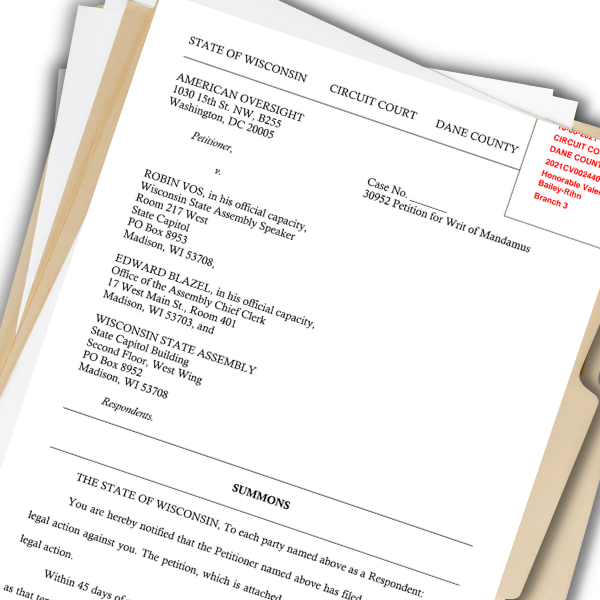
Wisconsin Assembly’s Partisan Election Investigation Frequently Destroyed Public Records
During a hearing in our lawsuit for public records from the investigation, Michael Gableman — the lawyer heading the inquiry — provided testimony indicating that records had been frequently destroyed.

On Thursday, American Oversight returned to court in its ongoing lawsuit for public records from the Wisconsin Assembly’s partisan investigation of the 2020 election. During the hearing, Michael Gableman — the lawyer heading the inquiry — provided testimony indicating that requested records from the first months of the investigation had been frequently destroyed.
Dane County Circuit Court Judge Valerie Bailey-Rihn had previously held the Assembly and Speaker Robin Vos in contempt for failing to comply with a court order to turn over the documents. Bailey-Rihn lifted the remedial sanctions order during Thursday’s hearing, finding that there was nothing further the Assembly and Vos could do to cure their contempt.
During the hearing, Gableman said he had frequently destroyed or disposed of records that he deemed not to be “helpful” to his inquiry, including notes that he took during trips to Arizona and election denier Mike Lindell’s “symposium” in South Dakota in August 2021. “Did I delete documents? Yes, I did,” Gableman said.
The judge noted that Gableman appeared to have “disposed” of “anything that didn’t fit into his preordained view of what happened” during the 2020 election in Wisconsin.
Gableman also stated that a Yahoo email account he had used in the early months of the election review had been deleted by someone in the Assembly’s Office of Special Counsel, which was created for Gableman’s inquiry in late August. In an affidavit filed with the court on Wednesday, Gableman said that the personal cell phone he used at the beginning of the review had malfunctioned. Gableman testified that he had not consulted with computer experts about recovering the records and had arrived at those conclusions himself.
Additionally, Gableman — who was drawing a taxpayer-funded $11,000 monthly salary — indicated that in July and August he did very little substantive work for the review. At that time, according to Gableman, he “did not have a very sophisticated or intricate understanding” of election processes, and most of his early work involved conducting research at a public library, where he said he took notes and printed articles. Gableman, who said he did not have a personal computer, did not retain those notes.
Bailey-Rihn remarked on certain contradictory aspects of Gableman’s testimony. For instance, American Oversight had previously uncovered expense and travel records from Gableman’s trip last August to visit the Arizona Senate’s discredited election “audit.” Those records clearly indicate that Gableman’s office submitted a reimbursement claim for hotel costs for five people. Confronted with those records today, he stated that only four people had taken part in the trip and was unable to explain why his office claimed reimbursement for a fifth.
Thursday’s hearing was the most recent in a lawsuit American Oversight filed against the Wisconsin Assembly and Speaker Robin Vos in October 2021 to compel the release of public records related to the Assembly’s 2020 election probe, including communications and contracts with contractors.
Earlier this month, during a hearing in another lawsuit brought by American Oversight against the Office of Special Counsel and the Assembly, Gableman refused to answer questions and accused the judge of failing to be a neutral arbiter. The court found OSC in contempt and ordered Gableman to prove OSC had adequately searched for and produced the requested records. Previously, in that same lawsuit, OSC had admitted in a letter that it “routinely deletes” records in its custody, prompting American Oversight to ask the court to bar OSC from deleting more records.
Following Thursday’s hearing, the court set a date for a future hearing to determine what punitive damages may be warranted for violations of Wisconsin’s open record laws.